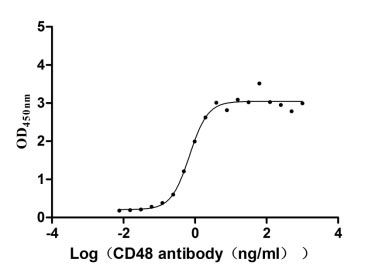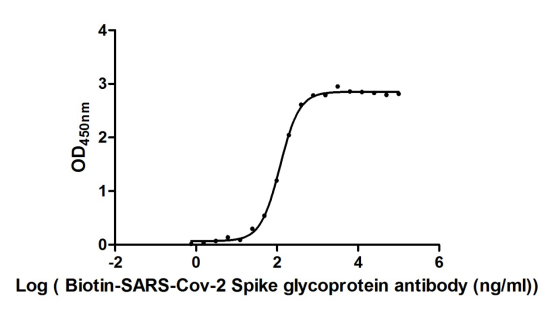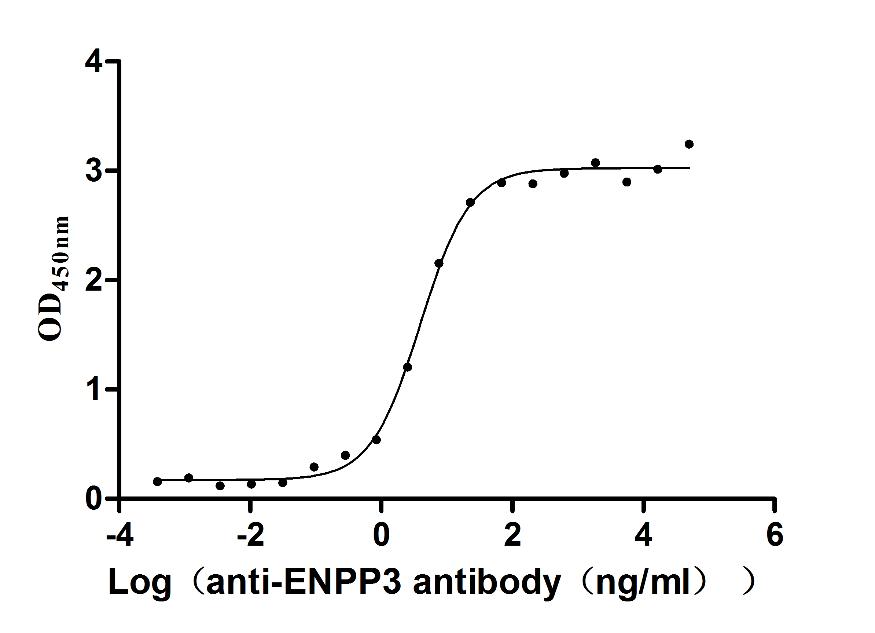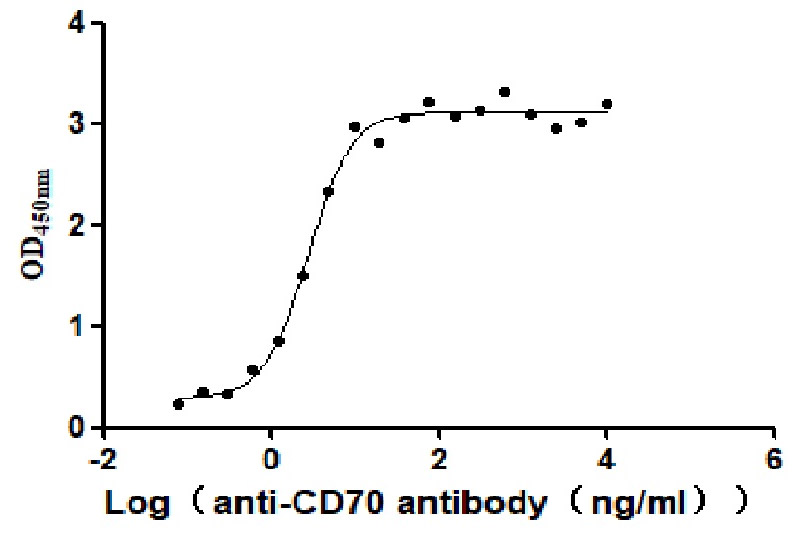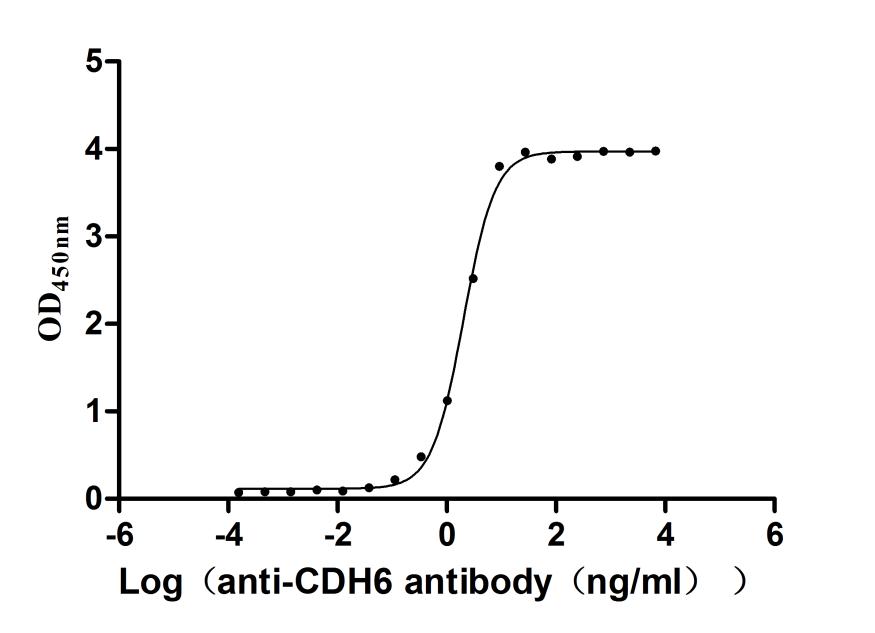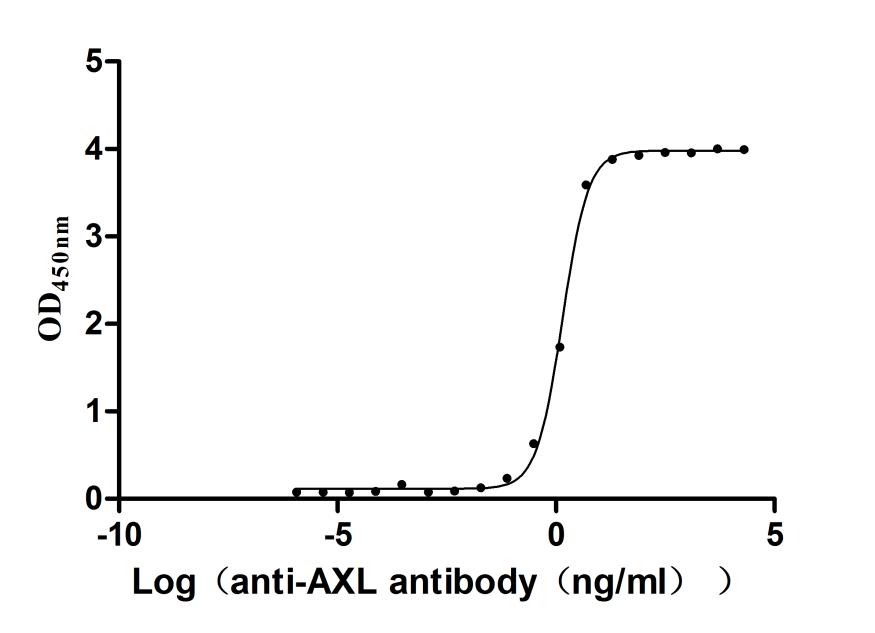Recombinant Mouse N-myc proto-oncogene protein (Mycn)
-
中文名称:小鼠Mycn重组蛋白
-
货号:CSB-YP015278MO
-
规格:
-
来源:Yeast
-
其他:
-
中文名称:小鼠Mycn重组蛋白
-
货号:CSB-EP015278MO
-
规格:
-
来源:E.coli
-
其他:
-
中文名称:小鼠Mycn重组蛋白
-
货号:CSB-EP015278MO-B
-
规格:
-
来源:E.coli
-
共轭:Avi-tag Biotinylated
E. coli biotin ligase (BirA) is highly specific in covalently attaching biotin to the 15 amino acid AviTag peptide. This recombinant protein was biotinylated in vivo by AviTag-BirA technology, which method is BriA catalyzes amide linkage between the biotin and the specific lysine of the AviTag.
-
其他:
-
中文名称:小鼠Mycn重组蛋白
-
货号:CSB-BP015278MO
-
规格:
-
来源:Baculovirus
-
其他:
-
中文名称:小鼠Mycn重组蛋白
-
货号:CSB-MP015278MO
-
规格:
-
来源:Mammalian cell
-
其他:
产品详情
-
纯度:>85% (SDS-PAGE)
-
基因名:
-
Uniprot No.:
-
别名:Mycn; Nmyc; Nmyc1; N-myc proto-oncogene protein
-
种属:Mus musculus (Mouse)
-
蛋白长度:Full length protein
-
表达区域:1-462
-
氨基酸序列MPSCTASTMP GMICKNPDLE FDSLQPCFYP DEDDFYFGGP DSTPPGEDIW KKFELLPTPP LSPSRAFPEH SPEPSNWATE MLLPEADLWG NPAEEDAFGL GGLGGLTPNP VILQDCMWSG FSAREKLERA VNEKLQHGHG PPGVSSACSA PGVGASSPGG RALGGSSSAS HTGATLPTDL SHPAAECVDP AVVFPFPVNK RESASVPAAP TSAPATSAAV TSVSVPATAP VAAPARAGGR PASSGEAKAL STSGEDTLSD SDDEDDEEED EEEEIDVVTV EKRRSSSNNK AVTTFTITVR PKTSALGLGR AQPGELILKR CVPIHQQHNY AAPSPYVESE DAPPQKKIKS EASPRPLKSV VPAKAKSLSP RNSDSEDSER RRNHNILERQ RRNDLRSSFL TLRDHVPELV KNEKAAKVVI LKKATEYVHA LQANEHQLLL EKEKLQARQQ QLLKKIEHAR TC
-
蛋白标签:Tag type will be determined during the manufacturing process.
The tag type will be determined during production process. If you have specified tag type, please tell us and we will develop the specified tag preferentially. -
产品提供形式:Lyophilized powder
Note: We will preferentially ship the format that we have in stock, however, if you have any special requirement for the format, please remark your requirement when placing the order, we will prepare according to your demand. -
复溶:We recommend that this vial be briefly centrifuged prior to opening to bring the contents to the bottom. Please reconstitute protein in deionized sterile water to a concentration of 0.1-1.0 mg/mL.We recommend to add 5-50% of glycerol (final concentration) and aliquot for long-term storage at -20℃/-80℃. Our default final concentration of glycerol is 50%. Customers could use it as reference.
-
储存条件:Store at -20°C/-80°C upon receipt, aliquoting is necessary for mutiple use. Avoid repeated freeze-thaw cycles.
-
保质期:The shelf life is related to many factors, storage state, buffer ingredients, storage temperature and the stability of the protein itself.
Generally, the shelf life of liquid form is 6 months at -20°C/-80°C. The shelf life of lyophilized form is 12 months at -20°C/-80°C. -
货期:Delivery time may differ from different purchasing way or location, please kindly consult your local distributors for specific delivery time.Note: All of our proteins are default shipped with normal blue ice packs, if you request to ship with dry ice, please communicate with us in advance and extra fees will be charged.
-
注意事项:Repeated freezing and thawing is not recommended. Store working aliquots at 4°C for up to one week.
-
Datasheet :Please contact us to get it.
靶点详情
-
功能:Positively regulates the transcription of MYCNOS in neuroblastoma cells.
-
基因功能参考文献:
- Distinct molecular pathways mediate Mycn and Myc-regulated miR-17-92 microRNA action in Feingold syndrome mouse models. PMID: 29636449
- MYCN-promoted SGO1 transcription and SGO1 expression tended to be higher in MYCN- or MYC-overexpressing cancers. Together, these findings indicate that SGO1 plays a role in the DNA damage response in interphase. PMID: 27539729
- we report the isolation and propagation of neuroblastoma sphere-forming cells with self-renewal and differentiation potential from tumors of the TH-MYCN mouse, an animal model of high-risk neuroblastoma with MYCN amplification PMID: 27705805
- miR-34a contributes to the expansion of Myeloid-derived suppressor cells by inhibiting the apoptosis via suppressing the expression of N-myc. PMID: 26833183
- the role of N-myc in mouse lens development, was examined. PMID: 28716713
- Using comparative genomic hybridization, s found that NCC-derived NBL tumors in mice acquired copy number gains and losses that are syntenic to those observed in human MYCN-amplified NBL including 17q gain, 2p gain and loss of 1p36. PMID: 28459463
- a Mycn target gene encoding the miR cluster miR-17~92, while most retinoblastomas reemerged without clear genetic alterations in either Mycn or known Mycn targets. This Rb/MYCN model recapitulates key genetic driver alterations seen in human retinoblastoma and reveals the emergence of MYCN independence in an initially MYCN-driven tumor. PMID: 28165337
- The findings reveal a PLK1-Fbw7-Myc signaling circuit that underlies tumorigenesis and validate PLK1 inhibitors, alone or with Bcl2 antagonists, as potential effective therapeutics for MYC-overexpressing cancers. PMID: 27773673
- ALKR1275Q cooperated with MYCN in the development of aggressive NB, possibly by downregulating the expression of ECM/BM-associated genes and by conferring malignant potentials to MYCN-expressing cells. PMID: 26829053
- Reuslts show that N-Myc overexpression leads to the development of poorly differentiated, invasive prostate cancer that is molecularly similar to human NEPC. PMID: 27728805
- Thus, this synergistic effect of ZD55-shMYCN in combination with doxorubicin provides a novel therapy strategy for doxorubicin-resistant neuroblastoma, and is a promising approach for further clinical development. PMID: 28711493
- Loss of N-myc significantly impairs the Sonic hedgehog signaling pathway and disrupts the expression of cell cycle effectors with a significant reduction of Ccnd2. PMID: 26238256
- MYCN overexpression is not sufficient for these cells to form tumors in nude mice PMID: 26222553
- MYCN plays a critical role in expansion and survival of aggressive medulloblastoma-propagating cells. PMID: 25785590
- The results of this study provided evidence that N-myc deficiency in the olfactory epithelium progressively diminishes proliferation and neurogenesis with negative consequences at structural and cellular levels. PMID: 24376126
- MYCN/LIN28B/Let-7/HMGA2 pathway implicated by meta-analysis of GWAS in suppression of post-natal proliferation thereby potentially contributing to aging PMID: 23639551
- The above results induced by overexpression of MYCN closely resemble the main aspects of human AML, suggesting that MYCN plays a role in the etiology of AML. PMID: 23554972
- a general mechanism for p53 inactivation in some embryonal cell types and consequent susceptibility to MycN oncogenesis at the point of embryonal tumor initiation PMID: 22907436
- Epigenetic regulation of the neuroblastoma genes, Arid3b and Mycn. PMID: 22751132
- a functional axis between MYCN and CDKL5 governing both neuron proliferation rate and differentiation. PMID: 22921766
- Mycn acts downstream of BMP and NRG1 cardiogenic signaling pathways to promote normal myocardial wall morphogenesis. PMID: 23063798
- Data have defined an important role for GCN5 in NSC and provided evidence that GCN5 is an important Myc transcriptional cofactor in vivo. PMID: 22745758
- findings demonstrate a pathogenic role for ALK(F1174L) in neuroblastomas overexpressing MYCN and suggest a strategy for improving targeted therapy for ALK-positive neuroblastoma PMID: 22789543
- Double deletion of c-Myc and N-Myc results in nearly complete loss of the residual pigmentation, indicating that N-Myc is capable of compensating for c-Myc loss of function in melanocytes. PMID: 22420299
- Demonstrate context-dependent transformation of neural stem cells in response to common oncogenic signal N-MYC. PMID: 22624711
- miRNAs expression in a mouse model (TH-MYCN/p53ER(TAM)) possessing a transgenic p53 allele that drives the expression of an inactive protein, miR-125b-3p and miR-676 were identified as directly or indirectly regulated by the level of functional p53 PMID: 22164278
- Paracrine signaling through MYCN enhances tumor-vascular interactions in neuroblastoma PMID: 22218692
- N-Myc directly induced the transcription of the class III histone deacetylase SIRT1, which in turn increased N-Myc protein stability PMID: 21698133
- N-Myc protein levels were increased in granule cell precursors in the presence of enforced Sna1 expression. N-Myc is a consistent target of Sna1. PMID: 21646478
- Possible functional relationship of N-Myc with a number of other cell proliferative and fate determining genes during ear development. PMID: 21448975
- Collectively, our data suggest that N-myc regulates growth, morphogenesis, and pattern formation during the development of the inner ear. PMID: 21562282
- Site-directed mutagenesis of binding sites within the Pss1 promoter demonstrated that Sp and N-Myc synergistically activate Pss1 expression in astrocytes PMID: 21068393
- Mycn is associated with acute lung injury PMID: 21297076
- Data demonstrate that correct N-myc developmental expression is achieved via cooperation of multiple positive and negative regulatory elements, and include a specific role for the transcription factor GATA3. PMID: 20855530
- Loss of Nmyc leads to severely disrupted self-renewal, pluripotency, and survival along with enhanced differentiation. PMID: 20537458
- These results reveal that Wnt signaling via N-myc is crucial for the control of neuron number in the developing neocortex. PMID: 20215343
- these findings identify Nmyc as a direct target of the Shh pathway that functions to regulate cell cycle progression in cerebellar granule neuron precursors. PMID: 12441288
- Transcriptional profiling of the Sonic hedgehog response: a critical role for N-myc in proliferation of neuronal precursors. PMID: 12777630
- Shh and PI3K signaling pathways converge on N-Myc to regulate neuronal precursor cell cycle progression. PMID: 14660435
- Essential in the developing lung for maintaining a distal population of progenitor cells. PMID: 15716345
- N-myc is identified as a lipopolysaccharide- and interferon gamma-inducible gene that is involved in apoptotic autoregulation of microglial activation. PMID: 15953367
- Our results indicate that forced expression of N-myc in the sensory lineage leads to unscheduled cell-cycle re-entry and excessive apoptosis and show that N-myc can affect the composition of different functional subtypes of sensory neurons in the DRG. PMID: 16133151
- These results provide definitive genetic evidence that expression of N-Myc and concomitant down-regulation of Ink4c and Kip1 contribute to the proper development of the cerebellum. PMID: 16864777
- N-myc is required for medulloblastoma genesis even in the presence of constitutively active signaling from the Shh pathway. PMID: 16951180
- Defects in the formation of N-Myc-dependent interdigital tissue may be a root cause of common syndromic forms of syndactyly. PMID: 17360777
- Nmyc is a regulator of genes involved in mRNA processing and a repressor of the imprinted gene Igf2r in the developing lung. PMID: 17486137
- The Nmyc promoter can form a complex with Smad4 suggesting that Nmyc is a direct downstream target of Smad4 during cardiogenesis. PMID: 17585069
- that BMP2 opposes Shh mitogenic activity by blocking Nmyc expression. We have identified TIEG-1 (KLF10) as the intermediary factor that blocks Nmyc expression through the occupancy of the Sp1 sites present in its promoter. PMID: 17951258
- N-Myc overexpression is highly oncogenic in mouse myeloid cells PMID: 18006809
- Huwe1 links destruction of N-Myc to the quiescent state that complements differentiation in the neural tissue PMID: 18488021
显示更多
收起更多
-
亚细胞定位:Nucleus.
-
数据库链接:
KEGG: mmu:18109
STRING: 10090.ENSMUSP00000045993
UniGene: Mm.16469
Most popular with customers
-
Recombinant Human CD48 antigen (CD48) (Active)
Express system: Mammalian cell
Species: Homo sapiens (Human)
-
Recombinant Severe acute respiratory syndrome coronavirus 2 Spike glycoprotein (S), partial (Active)
Express system: Mammalian cell
Species: Severe acute respiratory syndrome coronavirus 2 (2019-nCoV) (SARS-CoV-2)
-
Express system: Mammalian cell
Species: Macaca fascicularis (Crab-eating macaque) (Cynomolgus monkey)
-
Recombinant Human Epithelial discoidin domain-containing receptor 1 (DDR1), partial (Active)
Express system: Mammalian cell
Species: Homo sapiens (Human)
-
Recombinant Human CD70 antigen (CD70), partial (Active)
Express system: Mammalian cell
Species: Homo sapiens (Human)
-
Recombinant Mouse Cadherin-6(Cdh6),partial (Active)
Express system: Mammalian cell
Species: Mus musculus (Mouse)
-
Recombinant Human Tyrosine-protein kinase receptor UFO(AXL),partial (Active)
Express system: Mammalian cell
Species: Homo sapiens (Human)
-
Recombinant DT3C (Diphtheria toxin & spg 3C domain) for Antibody Internalization Assay (Active)
Express system: E.coli
Species: N/A


